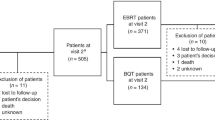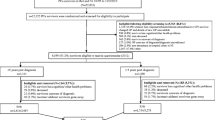Purpose:
To report long-term outcomes in terms of health-related quality of life (HRQoL) and survival of a dose-escalating radiotherapy protocol and to validate a new disease-specific HRQoL instrument.
Patients and Methods:
189 consecutive men with prostate cancer were analyzed; 127 patients had T1–2 (1% T1, 66% T2) and 62 patients (33%) T3 tumors. The pelvic lymphatics were treated to a dose of 50 Gy by external-beam irradiation. The prostate dose was limited to 40 Gy using compensators. The prostate was treated to the total nominal dose of 70 Gy using high-dose-rate (HDR) brachytherapy. The fraction dose was 15 Gy in the McNeal zone (planning target volume [PTV] 1), while 8–9 Gy were applied in the entire prostate (PTV 2). The HRQoL of the 145 long-term survivors was assessed using the EORTC QLQ-C30 and a new prostate-specific instrument (PSM-G 1.0). The reliability of the instruments used and HRQoL scale scores were calculated. Uni-/multivariate analyses of variance were performed.
Results:
At a mean follow-up of 6.5 years 86.3% of the patients were disease-free, and 78% were biochemically controlled. The mean Cronbach’s α-values were 0.81 for the QLQ-C30, and 0.74 for the prostate-specific module. Univariate analyses of variance by T-stage, grading, prostata-specific antigen (PSA) status after therapy and adjuvant androgen suppression (AS) revealed that PSA elevation after irradiation and AS were associated with significantly diminished HRQoL. In multivariate analyses AS significantly lowered the HRQoL without survival benefit.
Conclusion:
The described radiotherapy regimen represents a curative and well-tolerated treatment for localized prostate cancer. The HRQoL assessment with both instruments used was reliable. Adjuvant AS and PSA elevation were associated with diminished HRQoL.
Ziel:
Bericht von Langzeitergebnissen in Bezug auf gesundheitsorientierte Lebensqualität (LQ) und Überleben nach dosiseskalierter Strahlentherapie und Validierung eines neuen krankheitsspezifischen LQ-Instruments.
Patienten und Methodik:
189 konsekutive Patienten mit Prostatakarzinom wurden analysiert: 127 Patienten hatten einen T1–2- (1% T1, 66% T2) und 62 Patienten (33%) einen T3-Tumor. Die pelvinen Lymphabflusswege wurden bis zur Dosis von 50 Gy perkutan behandelt. Mittels Kompensatoren wurde die Dosis in der Prostataregion auf 40 Gy limitiert. Diese wurde mit Hilfe der High-Dose-Rate-(HDR-)Brachytherapie bis zur kumulativen Dosis von 70 Gy bestrahlt. Die Fraktionsdosis betrug 15 Gy in der McNeal-Zone (Planungszielvolumen [PTV] 1). In der Gesamtprostata wurden pro Fraktion 8–9 Gy appliziert (PTV 2). Die LQ der 145 Langzeitüberlebenden wurde mittels EORTC QLQ-C30 und eines neuen prostataspezifischen Instrumentes (PSM-G 1.0) gemessen. Die Reliabilität der verwendeten Instrumente und die LQ-Skalenmittelwerte wurden berechnet. Uni-/multivariate Varianzanalysen wurden durchgeführt.
Ergebnisse:
Nach einem mittleren Nachbeobachtungszeitraum von 6,5 Jahren waren 86,3% der Patienten krankheitsfrei sowie 78% klinisch und biochemisch rezidivfrei. Die mittleren Cronbach-α-Werte betrugen 0,81 für den QLQ-C30-Fragebogen und 0,74 für das prostataspezifische LQ-Modul. Univariate Varianzanalysen in Bezug auf T-Stadium, Grading, posttherapeutischen Status Indes prostataspezifischen Antigens (PSA) und adjuvante Androgensuppression (AS) ergaben, dass posttherapeutische PSA-Erhöhung und AS mit einer signifikant reduzierten LQ assoziiert waren. In multivariaten Analysen reduzierte allein die AS signifikant die LQ der Patienten ohne einen Überlebensvorteil.
Schlussfolgerung:
Das beschriebene Radiotherapieprotokoll stellt eine kurative und schonende Behandlungsmethode beim lokalisierten Prostatakarzinom dar. Die LQ-Messung war mit beiden Instrumenten reliabel. Adjuvante AS und posttherapeutische PSA-Erhöhung waren mit einer reduzierten gesundheitsorientierten LQ assoziiert.
Similar content being viewed by others
Author information
Authors and Affiliations
Corresponding author
Rights and permissions
About this article
Cite this article
Galalae, R.M., Loch, T., Riemer, B. et al. Health-Related Quality of Life Measurement in Long-Term Survivors and Outcome Following Radical Radiotherapy for Localized Prostate Cancer. Strahlenther Onkol 180, 582–589 (2004). https://doi.org/10.1007/s00066-004-1254-x
Received:
Accepted:
Issue Date:
DOI: https://doi.org/10.1007/s00066-004-1254-x
Key Words:
- Health-related quality of life (HRQoL)
- HDR brachytherapy
- Elective pelvic irradiation
- Conformal radiotherapy
- Prostate cancer




